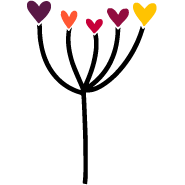We often ask, “How are you?” and instinctively reply, “I’m fine, thank you,” without a second thought. But are we truly okay? For many, this question is little more than a polite social ritual, not a genuine inquiry into one’s well-being. Out of habit—or to avoid discomfort—we give the expected response, “I’m fine,” even when we’re not. Over time, this routine not only masks our true emotions from others but can also lead us to deny or ignore our own feelings, making it easier to forget that we’re not really fine.
What I’ve been through
Many people experience some form of mental struggling, yet most remain unaware of it. I was the same years ago, trapped in a personal crisis as negative emotions quietly built up over the years. It wasn’t until much later that I realized I wasn’t truly fine—that others didn’t face the same internal struggles I did—and that something was fundamentally wrong within me.
Then, I began psychological counseling. With guidance, I started to uncover thoughts I had long buried, avoided, or resisted. It was a gradual process—peeling back each layer, like peeling an onion—revealing truths I had hidden even from myself.
These initially resisted thoughts didn’t disappear; they had consequences. Each effect led to new outcomes, creating a cycle that perpetuated itself. Over time, this chain reaction escalated, spinning out of control and plunging my life into chaos. The interconnectedness of causes and symptoms became so tangled that it felt nearly impossible to determine what triggered what.

The importance of realizing we are struggling
Recognizing our mental struggling is crucial—it’s the first step toward addressing the problem and finding solutions. Without acknowledging our pain, we can neither take action to alleviate it nor seek help to uncover its root causes. Over time, unresolved issues that may seem minor at first can accumulate, growing more complex and harder to resolve. This only makes it more difficult for us to lead a truly happy and fulfilling life.
Recognizing our struggles not only marks the beginning of healing but also deepens our understanding of ourselves. It allows us to explore our emotions and thoughts with greater clarity, fostering self-awareness. By identifying patterns or triggers that contribute to our pain, we can take proactive steps to adjust our behavior or environment, effectively reducing or even eliminating those triggers.
Additionally, acknowledging our struggles can help us seek support from others, which can be crucial in helping us cope with and overcome the challenges we face. It can help us connect with others who have similar experiences and find empathy, validation, and guidance.
In summary, recognizing our struggles is a crucial first step in nurturing our mental and emotional well-being. By acknowledging and addressing our struggles, we open the door to healing and personal growth. This awareness empowers us to improve our overall well-being and move closer to living a more fulfilling and meaningful life.

What prevents us from realizing that we are struggling
Knowing the importance of realization, let’s talk about what prevents us from realizing that we are struggling. There are many reasons why this might be the case.
Lack of awareness
Firstly, a lack of awareness can often prevent individuals from recognizing their mental or emotional struggles. Many conditions have a gradual onset, with changes that are so subtle they go unnoticed. For instance, someone may slowly develop symptoms of depression—such as persistent fatigue, difficulty sleeping, or losing interest in once-enjoyed activities—without realizing these signs are linked to depression.
It’s similar to the boiling frog effect: if you place a frog in boiling water, it will jump out to escape, but if you place it in cold water and heat it slowly, it will be boiled to death without realizing the danger. The same happens to us. In life, significant changes rarely happen suddenly. Instead, small, gradual shifts accumulate over time, subtly altering our emotions and thoughts. These tiny changes may go unnoticed until they’ve built up enough to finally catch our attention.
In some cases, people may experience symptoms for so long that they begin to see them as normal. For example, someone with chronic pain may come to accept it as a part of their daily life, even though it is affecting their quality of life.
Avoidance
Secondly, avoidance, our social values set a lot of do’s and don’ts, definitions of good and bad, how men should act, how women should act, how they should react in what situations, and more subordinate cultural labels to let people take their seats.
Due to the social animal attributes of human beings and many other reasons, people tend to choose their own labels and classify themselves into a certain category, so as to gain a sense of identity and security, and subconsciously make their behavior more consistent with this certain label. When some of our behaviors unconsciously jump out of the labels we set for ourselves, we will immediately have a lot of negative emotions, such as shame, anger, embarrassment, disappointment, etc.
When our brain senses some of our negative thoughts, some people may avoid recognizing their symptoms or condition because it is emotionally challenging or overwhelming. They may prefer to push their feelings aside or distract themselves with other activities rather than confront the issue, such as playing video games, watching tv, eating, working, doing housework, etc.
Mental health issues are even stigmatized in some cultures, and people may feel ashamed or embarrassed to admit they are struggling. They may attempt to minimize or dismiss their symptoms by telling themselves, “I’m fine, I have no problem,” and hypnotizing themselves to suppress awareness of these thoughts, which can prolong their struggling.
Mental health disorders
Thirdly, some conditions may cause cognitive or emotional changes that affect a person’s ability to recognize that they have a problem. For example, certain mental health disorders such as psychosis can cause changes in perception and thought processes that make it difficult for the person to recognize that they need help.
Lack of knowledge
Lastly, some people may not have access to information or resources to recognize and address their condition. This can be especially true for individuals living in marginalized communities or areas with limited access to healthcare. For example, if someone has never heard of ADHD or bipolar disorder, they may not realize that they are experiencing symptoms related to these conditions.
What’s more, some people may be hesitant to seek help because they are afraid of receiving a diagnosis or treatment. They may worry that a diagnosis will label them or that treatment will be too invasive or difficult to manage.
Conclusion
As mentioned earlier, “realizing that we are struggling” is not always automatic, and there are many factors that prevent us from fully accepting and acknowledging our emotions. This process of realization is often uncomfortable, but crucial. It marks the beginning of both our journey toward happiness and our path to freedom. Only when we develop the ability—or even a heightened awareness—to truly perceive ourselves can we understand our emotions, reflect on our past, make informed decisions in the present, and create a future that is authentically ours.


